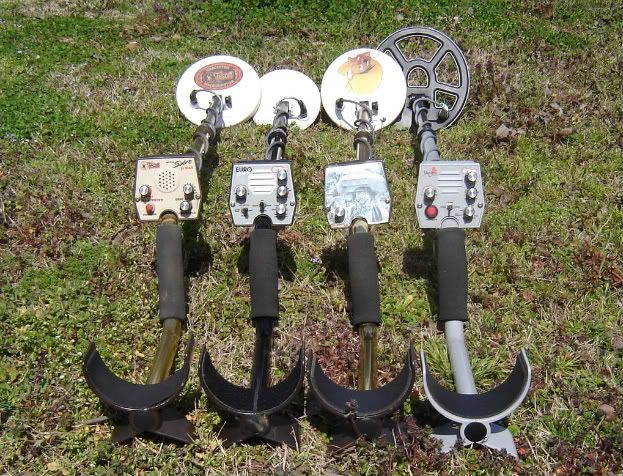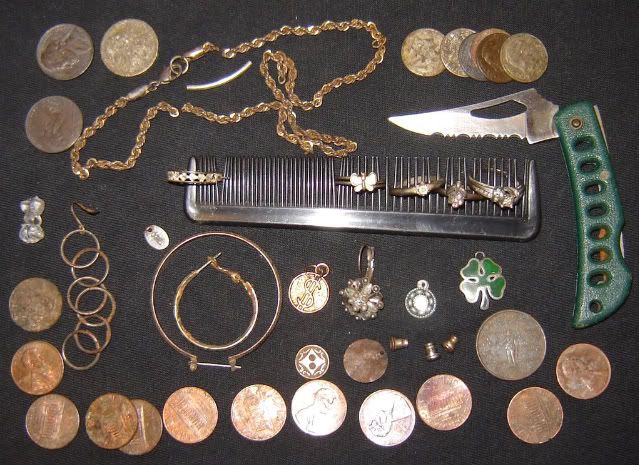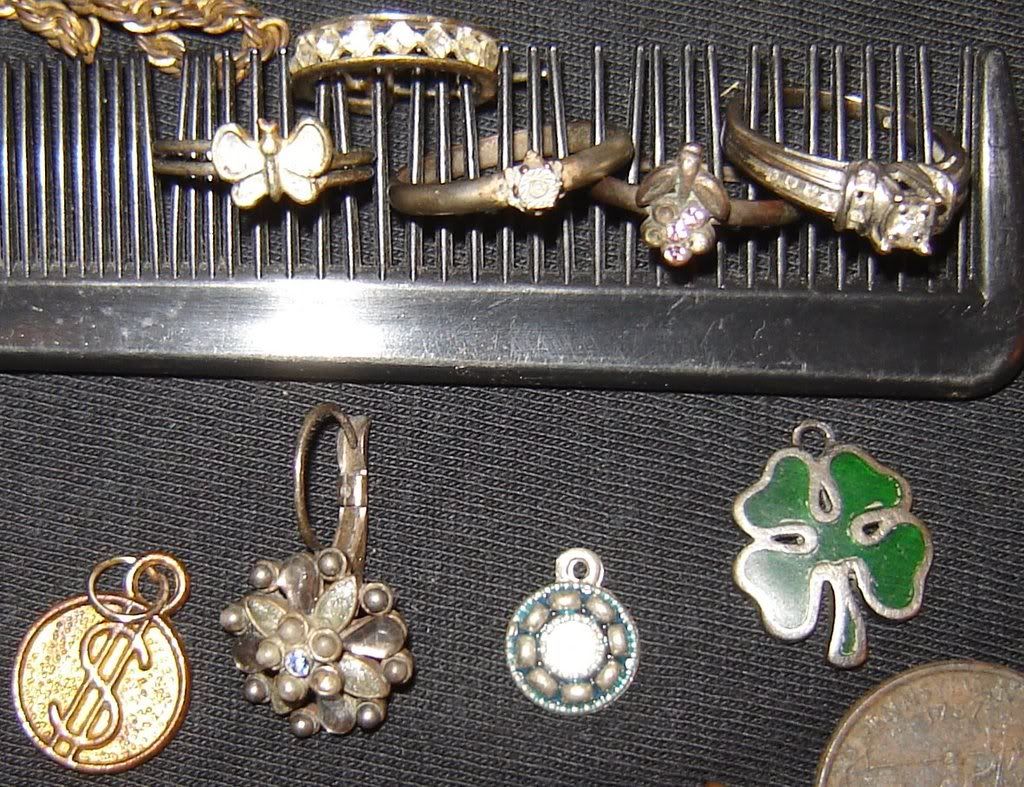Let me get off the technology wagon right now, and give you this:
Any detector you can buy for 200$ or more will suit your needs as a beginner.
I've tried many of them and still use some of them. This is a ballpark dollar number that has proven itself over and over again. Take it to heart - every manufacturer has.
But, we always get waaaaay too bogged down in all that electro-techno stuff, debating this detector or that one as better. My dear newbie, I encourage you to leave that to the "experts". Instead, realize there are other things of greater concern. With that said, allow me to present my,
"Top Ten Tips For Newcomers"
1. Dig!
This is foremost. We call it detecting, as in "finding metal objects," but that is only half of the matter. You won't ever know what you HAVE detected if you don't recover it. And you won't ever learn how your instrument responds to things if you don't. So bend the knee and dig... in the beginnig, dig everything your detector responds to.
2. DO NOT rely on meters or guages to solve your problems.
There is A LOT of junk bureid in the ground and nearly all of it can masquerade as good stuff. A Civil War slave tag or belt buckle can look like a large old can lid to your detector, for instance. I've seen it happen. Ditto other desirables.
All those luscious goodies you drool over on these forums have a huge pile of trash that accompanies them. No detector is reliable when it comes to positively identifying targets. Dont depend on them to do so.
For more on this, refer to Tip #1.
3. Turn the sensitivity down to start.
Dont expect to find stuff halfway to China, as most good things are within the first 8-12", at best. Also, detectors cannot materialize things from thin air nor vacuum them in from a distance, just by cranking up all the controls. Sensitivity, or SENS, that is too high only results in false signals and lots of frustration. Normally, I recommend doing the obvious: read the instructions.
4. Set time limits.
A. Plan to detect for a certain amount of time, as often as possible. Like any activity, good practice makes you better.
B. DO NOT detect longer that you should - set a limit on that, too. Remember you have a job and a family and friends.
5. Set Recovery Goals.
A certain coin, or artifact, a certain number of coins, etc. Then work to achieve them. I have mine, you should have yours. Some will say, "This is a hobby, and goals are for work" - dont listen to them.
6. Carry your detector with you as much as possible.
You never know when a chance to detect will come along and you want to be ready. This is one reason many detectorists have a backup unit. Spend the little money needed to get a carrying case for your unit.
(But dont store it in your car - EVER!! These are electronic instruments. The heat and jostling is murder on them and thieves know what they are worth, too).
7. Learn about your area and what you might actually find in specific locations.
It obviously does no good to take your detector to a parking lot, but you rarely need to go three states away, either. If you've done good research into your immediate locale, you will find many places close to home to search... places you can hit more often and with less aggravation. So learn to look at and see what may have been, not just what is there today. Every good detectorist does three things:
They learn about the earth itself. This includes the geology, geography and flora of the region.
They learn about the people of the area. Who, what, where, why and most importantly, WHEN.
They learn about precise location. The land is vast; you need to narrow your searches down through research and reconnoiter.
8. Talk to your friends and family about your new hobby.
Ask if they know any old places, or good modern places, where lots of people have been active. These people can likely lead you to many places, especially in the beginning.
Become and ambassador for this pastime. Make up some simple business cards on your computer, declaring yourself a "detectorist." Hand them around whenever the chance arises. Ask people if they have any ideas for places to search. But don't refer to yourself as a treasure hunter. That's for the unwise, since the word "treasure" gives everyone else the wrong idea.
9. Plan to do all sorts of detecting.
You are new and this hobby has lots to offer. Dont imagine yourself only "this sort" of detectorist or "that sort." Try it all.
10. Get a "possibles bag." I use a rugged, $2 carry-on luggage case from the thrift store. Keep these things in it:
Extra headphones.
Extra batteries for your detector(s)
2 Digging trowels (Get purpose built tools - not the cheap junk from WalMart.)
2 recovery aprons
1 10" probe
1 long screwdriver
1 8-10" inch hunting knife
1 sand sifting scoop
Garden gloves
Flashlight
Super glue and duct tape
...You can have more, but youll need all of these sooner or later.
BONUS TIP #11: "Be Determined and Have Fun."
[size=x-small]Copyright (C), 2008, dahut[/size]
Detecting success comes from effort and perseverence, not solely from electronic gear. Equipment that is up to the task is a requisite, but even the best gear wont find things in the wrong places.





